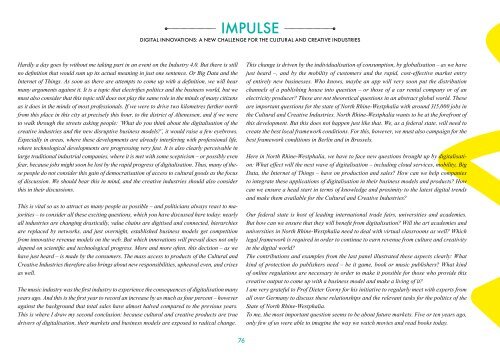DIGITAL IST KULTUR CULTURE IS DIGITAL – DIGITAL IS CULTURE
1n3RpM7
1n3RpM7
Erfolgreiche ePaper selbst erstellen
Machen Sie aus Ihren PDF Publikationen ein blätterbares Flipbook mit unserer einzigartigen Google optimierten e-Paper Software.
IMPULSE<br />
<strong>DIGITAL</strong> INNOVATIONS: A NEW CHALLENGE FOR THE CULTURAL AND CREATIVE INDUSTRIES<br />
Hardly a day goes by without me taking part in an event on the Industry 4.0. But there is still<br />
no definition that would sum up its actual meaning in just one sentence. Or Big Data and the<br />
Internet of Things. As soon as there are attempts to come up with a definition, we will hear<br />
many arguments against it. It is a topic that electrifies politics and the business world, but we<br />
must also consider that this topic still does not play the same role in the minds of many citizens<br />
as it does in the minds of most professionals. If we were to drive two kilometres further north<br />
from this place in this city at precisely this hour, to the district of Altenessen, and if we were<br />
to walk through the streets asking people: ‘What do you think about the digitalisation of the<br />
creative industries and the new disruptive business models?’, it would raise a few eyebrows.<br />
Especially in areas, where these developments are already interfering with professional life,<br />
where technological developments are progressing very fast. It is also clearly perceivable in<br />
large traditional industrial companies, where it is met with some scepticism <strong>–</strong> or possibly even<br />
fear, because jobs might soon be lost by the rapid progress of digitalisation. Thus, many of these<br />
people do not consider this gain of democratisation of access to cultural goods as the focus<br />
of discussion. We should bear this in mind, and the creative industries should also consider<br />
this in their discussions.<br />
This is vital so as to attract as many people as possible <strong>–</strong> and politicians always react to majorities<br />
<strong>–</strong> to consider all these exciting questions, which you have discussed here today: nearly<br />
all industries are changing drastically, value chains are digitised and connected, hierarchies<br />
are replaced by networks, and just overnight, established business models get competition<br />
from innovative revenue models on the web. But which innovations will prevail does not only<br />
depend on scientific and technological progress. More and more often, this decision <strong>–</strong> as we<br />
have just heard <strong>–</strong> is made by the consumers. The mass access to products of the Cultural and<br />
Creative Industries therefore also brings about new responsibilities, upheaval even, and crises<br />
as well.<br />
The music industry was the first industry to experience the consequences of digitalisation many<br />
years ago. And this is the first year to record an increase by as much as four percent <strong>–</strong> however<br />
against the background that total sales have almost halved compared to the previous years.<br />
This is where I draw my second conclusion: because cultural and creative products are true<br />
drivers of digitalisation, their markets and business models are exposed to radical change.<br />
This change is driven by the individualisation of consumption, by globalisation <strong>–</strong> as we have<br />
just heard <strong>–</strong>, and by the mobility of customers and the rapid, cost-effective market entry<br />
of entirely new businesses. Who knows, maybe an app will very soon put the distribution<br />
channels of a publishing house into question <strong>–</strong> or those of a car rental company or of an<br />
electricity producer? These are not theoretical questions in an abstract global world. These<br />
are important questions for the state of North Rhine-Westphalia with around 315,000 jobs in<br />
the Cultural and Creative Industries. North Rhine-Westphalia wants to be at the forefront of<br />
this development. But this does not happen just like that. We, as a federal state, will need to<br />
create the best local framework conditions. For this, however, we must also campaign for the<br />
best framework conditions in Berlin and in Brussels.<br />
Here in North Rhine-Westphalia, we have to face new questions brought up by digitalisation:<br />
What effect will the next wave of digitalisation <strong>–</strong> including cloud services, mobility, Big<br />
Data, the Internet of Things <strong>–</strong> have on production and sales? How can we help companies<br />
to integrate these applications of digitalisation in their business models and products? How<br />
can we ensure a head start in terms of knowledge and proximity to the latest digital trends<br />
and make them available for the Cultural and Creative Industries?<br />
Our federal state is host of leading international trade fairs, universities and academies.<br />
But how can we ensure that they will benefit from digitalisation? Will the art academies and<br />
universities in North Rhine-Westphalia need to deal with virtual classrooms as well? Which<br />
legal framework is required in order to continue to earn revenue from culture and creativity<br />
in the digital world?<br />
The contributions and examples from the last panel illustrated these aspects clearly: What<br />
kind of protection do publishers need <strong>–</strong> be it game, book or music publishers? What kind<br />
of online regulations are necessary in order to make it possible for those who provide this<br />
creative output to come up with a business model and make a living of it?<br />
I am very grateful to Prof Dieter Gorny for his initiative to regularly meet with experts from<br />
all over Germany to discuss these relationships and the relevant tasks for the politics of the<br />
State of North Rhine-Westphalia.<br />
To me, the most important question seems to be about future markets. Five or ten years ago,<br />
only few of us were able to imagine the way we watch movies and read books today.<br />
76


